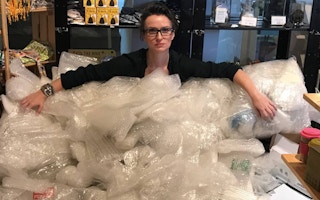As Covid-19 forces businesses worldwide to reinvent themselves, social entrepreneurs are getting creative to help communities hit hard by the pandemic - from a Ugandan medicine-on-wheels service to upcycled face masks made by vulnerable women in Peru.
While recessions and falling revenue are affecting ethical businesses too, many such companies are proving particularly adept at innovating and finding new opportunities.
“Social innovation is the DNA of social entrepreneurs,” said Vincent Otieno Odhiambo, regional director for Ashoka East Africa, a non-profit working with social enterprises - businesses aiming to do good while making a profit.
“They are accustomed to tackling complex social problems and therefore design innovative solutions that create better conditions of life,” he told the Thomson Reuters Foundation to mark Social Enterprise Day on Thursday.
Started by Social Enterprise UK, the sector’s trade body in Britain, and held annually on the third Thursday of November, the day aims to highlight the sector’s global impact. The campaign has since expanded to other parts of the world.
With the pandemic taking a heavy toll on vulnerable communities around the world, companies with a social focus are even encouraging some traditional businesses to have a rethink.
“We have seen them tackle perennial challenges ranging from access to healthcare and education, remote working, economic resilience all the way to transparency or fighting fake news,” Otieno Odhiambo said.
“
We realised everyone on the planet was also ordering online and that online packaging was delivered with an insane amount of plastic waste, often more plastic waste than the goods delivered.
Claire Sancelot, founder, The Hive Bulk Foods
‘Outside the box’
In Asia, social enterprises have turned to making face shields and protective suits for doctors, and linking those who have lost their jobs to careers in sustainable fields.
As movement curbs remain in place across many cities, a surge in online deliveries has led to a mountain of plastic waste, prompting Malaysia’s The Hive Bulk Foods to start collecting discarded packaging for reuse.
The social enterprise, a zero-waste chain selling products from refugees and local organic farmers, said items like bubble wrap quickly filled up its warehouse. It donates the packaging to other businesses so it can be used again.
“We realised everyone on the planet was also ordering online and that online packaging was delivered with an insane amount of plastic waste, often more plastic waste than the goods delivered,” said founder Claire Sancelot.
“We just want to prove that despite the pandemic we can change the business model and move to a more circular economy.”
In Peru’s capital Lima, Valery Zevallos - who founded an ethical fashion brand called Estrafalario that employs poor women, female prisoners and domestic violence survivors - knew she had to adapt as shopping mall sales plunged during lockdown.
She started a new line of handmade face masks made from recycled materials, working with nearly 40 women. So far, they have sold more than 26,000 masks and donated some to community groups and female inmates.
“We had to think out of the box,” said the 30-year-old designer, adding that the company’s online clothes sales have jumped 400 per cent as customers go to its website to buy the masks.
“It’s a win-win. We sell clothes and they earn,” she said.
In Africa, where the pandemic has strained fragile healthcare systems and made it even harder for people to get to medical centres and pharmacies, Uganda’s Kaaro Health started sending its nurses to treat patients at home.
The company, which offers pre-natal check-ups and child immunisations at its solar-powered container clinics, also put its technicians on motorbikes, mounted with refrigerated clinic kits, to collect medical samples and deliver prescriptions.
Across the border in Kenya, CheckUps Medical, which offers remote diagnostic and pharmacy services, has trained motorbike taxi drivers to identify people in need of medication or teleconsultation in remote areas.
‘Building back better’
Like other pandemic-hit businesses, social enterprises have struggled financially this year but their swift response could spur big business into more collaborations and a rethink of dominant business models.
“What Covid-19 has shown us is that the massively complicated international supply chains are really fragile when you have a pandemic,” said Tristan Ace, who leads the British Council’s social enterprise programme in Asia.
“One positive outcome that we have seen is corporates starting to incorporate social enterprise in their local areas more, more than just relying on the global supply chains.”
Yet major industry players and governments will have to take the lead - such as changing procurement practices and encouraging more impact investing - as the solutions offered by social enterprises are often small-scale.
“As economies begin to recover, we need to think about the big levers that will support the delivery of positive impact at scale, which should be led by big businesses and governments,” said Louise Aitken from Ākina, a New Zealand consultancy working with social enterprises and corporates.
“This is beyond building back better, it’s actually about building impact into our recovery,” the chief executive said.
This story was published with permission from Thomson Reuters Foundation, the charitable arm of Thomson Reuters, that covers humanitarian news, climate change, resilience, women’s rights, trafficking and property rights. Visit http://news.trust.org/climate.














